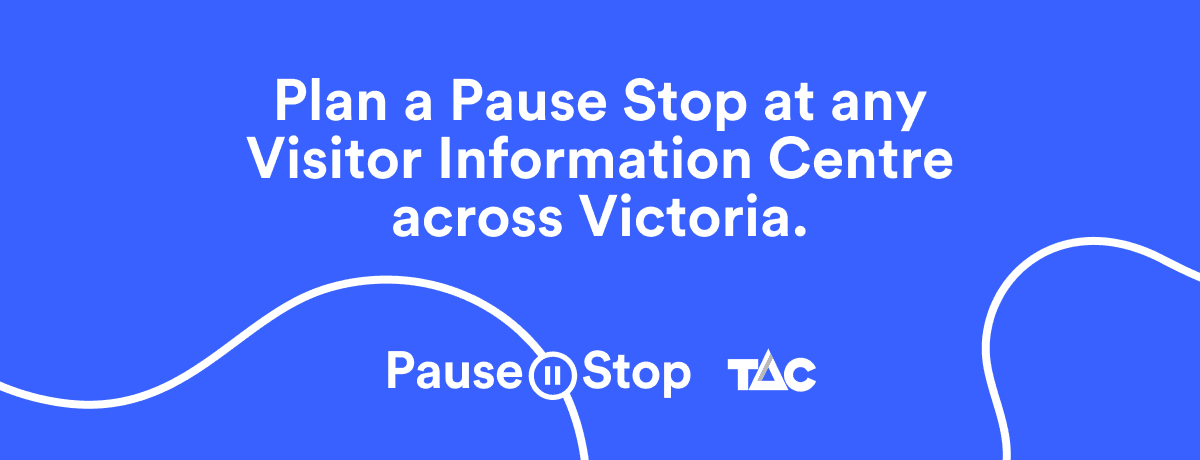Pause, Recharge, and Stay Safe on the Great Ocean Road
Long drives call for regular breaks — not just to soak in the scenery, but to help you arrive safely. The TAC Pause Stop initiative encourages travellers to plan their journey, pull over, and recharge to combat driver fatigue.
Along the Great Ocean Road, accredited Visitor Information Centres are welcoming places to pause at any time of year. Offering local insights, facilities, and friendly advice, they’re the perfect spot to take a break and prepare for the next leg of your adventure.
A simple pause could save your life — take the time to recharge.

Keep left, every time you drive
In Australia, all vehicles travel on the left side of the road. This may be different to the side on which you normally drive. Ask your passengers to remind you to drive on the left side of the road each time you set off and when you are turning at an intersection.

Allow extra time
Allow extra time on Victorian roads. Your journey may take longer than you expect. Some of Victoria’s roads have varying conditions and can be narrow and winding. While it may look close on a map, driving times may take longer than expected. Plan ahead. Map out your trip, make sure you allow extra time to get to your destination, including rest stops.

Take regular breaks
When planning a long drive have a good night’s sleep before the trip, especially after a long flight to Australia, and where possible, share the driving with your companions. Take regular rest breaks every two hours, get out of the vehicle and have a stretch.
Everyone must wear seatbelts
Wear a seatbelt when travelling in a vehicle, it’s the law. Children under age seven must be in an appropriate child restraint. Your rental vehicle company can rent child restraints to you if you didn’t bring your own.

Drive within the limits and to the conditions
There are different speeds on different sections of roads. Speed limits are strictly enforced in Victoria. In Victoria, you might experience four seasons in one day. Because of this, weather-related hazards on the road can occur at any time. Stay within the speed limit and always choose an appropriate speed for the driving conditions. See current traffic conditions.

Your speed affects others
If driving slowly, pull over where it is safe and let faster traffic pass. If you’re driving a campervan or motorhome or towing a caravan and you have traffic backed up behind you, pull over as soon as you can safely do so to let other vehicles pass. Use passing lanes or slow vehicle turnouts whenever possible, and never cross a solid white line on your side of the centre line.
Look out for animal hazards
Watch for animals straying onto the road especially on rural roads near sunset and sunrise.
Keep your headlights on to be seen more easily
In regional areas it is common for drivers to have their headlights on as they are more easily seen.

Taking photos? Pull over somewhere safe
Keep your eyes on the road, not the scenery. If you want to stop and look at the view, make sure you pull completely off the road in a place that is safe to stop.

Avoid distractions. No mobile phones
Drivers are not permitted to use a handheld mobile phone when driving – it’s against the law. If you need to make a call or send a text, pull over at a rest area or in a safe place.

Don’t drive impaired by drugs or alcohol
Driving under the influence of drugs or alcohol is extremely dangerous and Victoria has very serious penalties if you are caught doing this. Victoria has a blood alcohol concentration limit of 0.05% for a fully licensed driver. You cannot drive while affected by any drug, including cannabis which might be legal in other countries.

Choose the safest vehicle
When hiring or buying a vehicle, always choose the safest vehicle you can afford.

Get to know the road rules, signs and markings before you drive
It is important to understand our rules for driving in Victoria before you get behind the wheel on our roads. Obey road signs and markings. They warn you of possible dangers and provide information. They tell you what the rules are and what the road conditions are like. Stop signs mean you must bring your vehicle to a complete stop and give way to all traffic.
If you break the road rules or cause an accident, you could be fined or prosecuted. To ride a motorcycle or motor scooter, you need to wear an approved helmet and have a valid motorcycle permit/licence, it’s the law. If you wish to drive in Victoria you must hold a current, valid driving licence issued in the country in which you live. Carry it with you at all times when driving.



